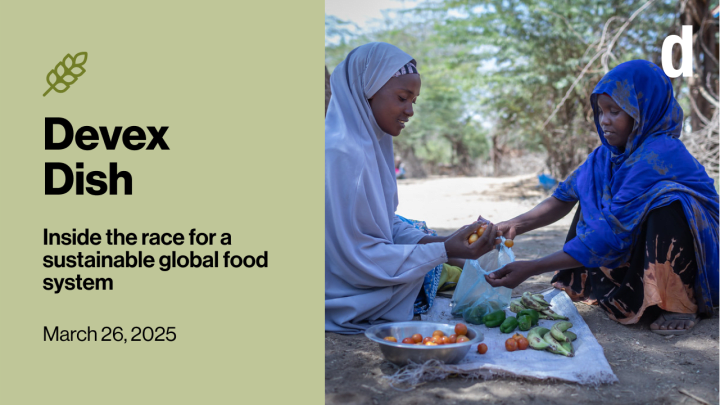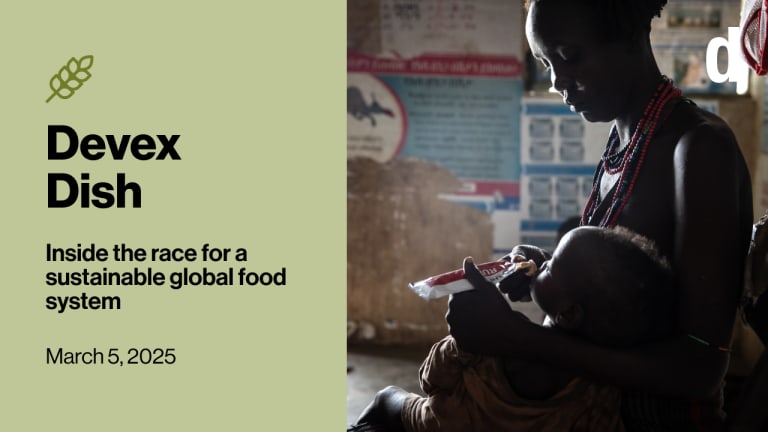
Bonjour from Paris! I’m here for the Nutrition for Growth, or N4G, summit, an event four years in the making that aims to put nutrition at the center of sustainable development — and garner political and financial commitments toward ending malnutrition in all its forms.
The N4G summit is typically organized by the same country that most recently hosted the Olympics and Paralympic Games. Hanging over this year’s event is the dark cloud of foreign aid cuts, primarily from the United States, the world’s biggest aid donor country as well as the biggest donor of food aid. The previous N4G summit, held in Tokyo in 2021, raised $27 billion. Most people I’ve spoken to here doubt that Paris will be able to top that.
This is a preview of Devex Dish
Sign up to this weekly newsletter to get the inside track on how agriculture, nutrition, sustainability, and more are intersecting to remake the global food system.
“Tokyo was a great success, and it was an era of very strong assistance from bilateral partners, and there were resources: strong commitments from U.N. agencies and civil society,” Afshan Khan, assistant secretary-general of the United Nations and coordinator of the Scaling Up Nutrition, or SUN, Movement, tells me. We are now in a very different era.
There’s a big push for other donors to come up with more financing — namely, philanthropy, multilateral development banks, or MDBs, and regional development banks. The phrase I keep hearing is “diversification of funding sources.” And there’s a much bigger presence of MDBs at this summit compared to the last. Brieuc Pont, France's special envoy on nutrition — who is charged with putting on the entire event — tells me there were a few stones left unturned since Tokyo.
“Philanthropies are stepping up. But it's still a long way away from the need, which means there’s this emphasis on greater efficiency, more creative programming, more capacity building,” Roy Steiner, senior vice president for the food initiative at the Rockefeller Foundation, tells me. There’s also greater emphasis on countries committing to policies such as taxing soda, fighting ultraprocessed foods, offering healthier school meals, and forbidding aggressive marketing of breastmilk substitutes.
It’s worth setting the table to recall why we’re here: Malnutrition is the leading cause of infant mortality worldwide, and it’s responsible for nearly half of deaths among children under 5 years old. Every country, no matter their income level, deals with nutrition challenges — whether it’s malnutrition, overweight or underweight populations, or a range of deficiencies.
Solving these problems would be wise for any aid donor or domestic policymaker: As Thani Mohamed-Soilihi, France's minister delegate for Francophone countries and international partnerships, reminds me, World Bank data indicates that every dollar invested in nutrition generates a $23 return — and “this return on investment is unmatched among development policies.” The costs of doing nothing are significant: When people don’t have enough to eat, and aren’t consuming healthy diets, it can devastate lives and economies for years to come. Preventable undernutrition costs the world $761 billion per year.
So who’s here? Leaders and staffers from just about every INGO working on nutrition, along with various country delegations. Sources tell me French President Emmanuel Macron will give remarks tomorrow afternoon, though it’s not officially confirmed. Also in town this week are King Letsie III of Lesotho; First Lady Rosângela “Janja” Lula da Silva of Brazil; the vice presidents of Côte d’lvoire, Nigeria, and Liberia; the World Food Programme’s Cindy McCain; UNICEF’s Catherine Russell; the International Fund for Agricultural Development’s Alvaro Lario; and more. I’m told the United States has not sent a delegation.
As for what’s on the agenda: Today will see the launch of the Global Compact on Nutrition Integration, a SUN Movement and United Kingdom-led effort to mobilize and implement commitments to integrate nutrition across sectors that may not have traditionally prioritized it, such as trade, climate resilience, and global health. Tomorrow, the two-day summit itself kicks off. Friday will feature a series of events around enlisting the support of multilateral development banks, hosted by Finance in Common — a network of public development banks — with the support of the French development agency AFD. Watch this space for a full list of announcements.
Are you in Paris for N4G? I’d love to meet you and hear what stories you think we should be covering. Shoot me a note at tania.karas@devex.com with any tips and announcements.
Background reading: This French diplomat thinks nutrition is a ‘magic wand’ for development (Pro)
See also: Obesity is on the rise in Africa. Here’s what UNICEF is doing about it
+ Not yet a Devex Pro member? Start your 15-day free trial now to access the event as well as all our expert analyses, insider insights, funding data, and more. Check out all the exclusive content and events available to you.
Small but mighty
Here in Paris, prenatal vitamins are getting their moment in the spotlight. Tomorrow, the Children’s Investment Fund Foundation, the Eleanor Crook Foundation, the Gates Foundation, and Kirk Humanitarian will officially announce more than $250 million in contributions to prenatal vitamins — known as multiple micronutrient supplements, or MMS — but you’re hearing it in Dish first. They’re also challenging other public and private donors to step up with the aim of reaching $1 billion for MMS by the United Nations General Assembly in September.
“At N4G, it’s a unique opportunity to really mobilize the international community,” Yashodhara Rana, director of policy and research for maternal and child nutrition at the Eleanor Crook Foundation, tells Devex, calling MMS a “small but mighty intervention.”
MMS are a combination of 15 essential vitamins and minerals that, when taken daily during pregnancy, can improve women’s health, prevent anemia, and reduce the risk that babies will be born early or with low birth weight. They’re considered a “best buy” in global health spending at a cost of less than two cents per tablet, Devex contributor Andrew Green writes. But despite their effectiveness, most women in low- and middle-income countries with high rates of maternal malnutrition and child mortality don’t take MMS. Rather, they receive an inferior supplement with only two ingredients — iron and folic acid — if they get a supplement at all.
But years of research and advocacy around MMS are starting to pay off. In 2021, the World Health Organization added MMS to its essential medicines list — which government policymakers look to when deciding which interventions to purchase and prioritize. Now countries are taking it up at the national level and devoting domestic financing to it.
Read: Prenatal vitamins get a fundraising boost at Nutrition for Growth summit
See also: New ways of fortifying staple foods could save lives. Here’s how
Number munching
2.3 million
—That’s the number of children in low- and middle-income countries who will be cut off from treatment for severe acute malnutrition, or SAM, due to reductions in foreign aid budgets by the United States and other Western donor nations. Without treatment, up to 60% of those children may die.
An article in the journal Nature, published today, attempts to quantify the impact of aid budget cuts on nutrition. And the figures are alarming. The aid cuts are estimated to mean a 44% reduction of the $1.6 billion in donor aid provided toward global nutrition targets in 2022 — or what the writers call a “nutrition funding collapse.” It’s not just the dismantling of the U.S. Agency for International Development; other countries have announced reductions over the next three to five years, too: the United Kingdom (40%); France, the N4G host country (37%); the Netherlands (30%); and Belgium (25%). The authors project 369,000 additional child deaths per year due to the impacts of these cuts on SAM programs, with 163,500 linked to U.S. aid reductions alone — and this may be an underestimate, they warn.
Bringing home the bacon
Your next job?
Senior Nutrition-Sensitive Agriculture and Food Security Adviser
Abt Global Inc.
Australia
The article is written by Saskia Osendarp of the Micronutrient Forum, Marie Ruel of the International Food Policy Research Institute, Emorn Udomkesmalee of the Institute of Nutrition at Mahidol University in Thailand, Masresha Tessema of the Ethiopian Public Health Institute, and Lawrence Haddad of the Global Alliance for Improved Nutrition. All are members of the Standing Together for Nutrition consortium.
“Failure to act now will result not only in a drastic increase in child mortality but also in long-term societal damage that will reverberate across generations,” they write. “It is imperative that global development partners, governments and donors mobilize immediately to safeguard nutrition for the world’s most vulnerable populations. Our collective future depends on it.”
Background reading: ‘The system is breaking’ — US aid freeze threatens child malnutrition care
See also: The Trump administration’s flip-flop on treating malnourished children (Pro)
And don’t miss: Why the US aid freeze could be a moment to reform food aid (Pro)
A mouthful
“Financing for RUTF is literally like playing Tetris. You start playing not knowing what’s the next piece that’s going to fall beyond it. And as the game progresses, the stress becomes harder because it’s becoming faster and faster. … It’s like this every single year.”
— Saul Guerrero, senior adviser on financing for child nutrition and development at UNICEFGuerrero spoke at an N4G panel yesterday in Paris on fixing the financing gap for ready-to-use therapeutic foods, or RUTFs, and other specialized foods. UNICEF faces major funding issues and could run out of RUTF supplies to treat children in Ethiopia and Nigeria by May. The solution to the problem of stockouts and financing shortages, Guerrero said, is a “stabilization fund” that allows UNICEF and other aid organizations to know exactly how much funding is coming in — so that they can issue purchase orders for the countries where it’s needed. UNICEF estimates that $1.4 billion per year is needed.
Related: What is the Child Nutrition Fund? (Pro)
Background: Gates Foundation sounds the alarm on the crisis of child malnutrition
Chew on this
Europe is cutting development spending, and it’s not because of Trump. [Devex Pro]
The United Nations has voted to extend its Decade of Action on Nutrition to 2030. [Permanent Mission of France to the UN via X]
The Food and Agriculture Organization has suspended projects after the White House froze hundreds of millions in U.S. funding to the agency. [Politico]




